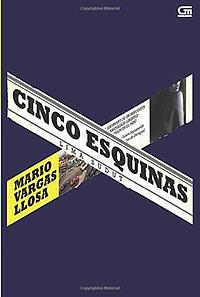Take a photo of a barcode or cover
Cinco Esquinas se trata del escándolo, del poder, y del amor. Contado de una manera no lineal y dejando cruzarse las varias historias de los personajes, este cuento enfatiza la intriga y el misterio en su propria estructura. Al principio, pensé que se trataba de una relación lésbica pero resulta que este libro tiene mucho más entre sus páginas.
El carácter principal de esta historia no es una persona, sino una revista de amarillismo conocida como 'Destapes'. Cuando el señor Enrique Cárdenas se encuentra en medio de un polémico tramado por susodicha revista, allí comienza la historia. Resulta que este estimado señor participó en una orgía hacía dos años...y qué bien que hay fotos. Las fotos se publican en la revista y allí va la cosa.
Lo que realmente me interesó en este libro no era el argumento en sí, sino la cualidad de la escritura. Un ejemplo en particular era un capítulo en que Llosa describe casi cinco escenas distintas como si fueran pasando a la misma vez en el texto. De hecho, acontece varias veces que hay una ausencia bien clara de una transición entre dos o más escenas. Una persona está hablando en una cena junta al mar y de repente, en la próxima línea, nos hallamos en la ciudad con una pieza de diálogo que parece responder a la última personaje. Claro que no es posible; es una decisión del escritor de dejar un poco borrosos los bordes entre eventos en el texto. Sin embargo, lo que me impresiona es que esto no lo confundido que se espera, incluso es fácil de entender. Conlleva una sensación de fluidez que le saca al lector del texto y le deja en un mundo ficticio pero extrañamente real. Debido solo a esta habilidad de Llosa, recomendaría este libro para cualquier persona.
El carácter principal de esta historia no es una persona, sino una revista de amarillismo conocida como 'Destapes'. Cuando el señor Enrique Cárdenas se encuentra en medio de un polémico tramado por susodicha revista, allí comienza la historia. Resulta que este estimado señor participó en una orgía hacía dos años...y qué bien que hay fotos. Las fotos se publican en la revista y allí va la cosa.
Lo que realmente me interesó en este libro no era el argumento en sí, sino la cualidad de la escritura. Un ejemplo en particular era un capítulo en que Llosa describe casi cinco escenas distintas como si fueran pasando a la misma vez en el texto. De hecho, acontece varias veces que hay una ausencia bien clara de una transición entre dos o más escenas. Una persona está hablando en una cena junta al mar y de repente, en la próxima línea, nos hallamos en la ciudad con una pieza de diálogo que parece responder a la última personaje. Claro que no es posible; es una decisión del escritor de dejar un poco borrosos los bordes entre eventos en el texto. Sin embargo, lo que me impresiona es que esto no lo confundido que se espera, incluso es fácil de entender. Conlleva una sensación de fluidez que le saca al lector del texto y le deja en un mundo ficticio pero extrañamente real. Debido solo a esta habilidad de Llosa, recomendaría este libro para cualquier persona.
informative
tense
fast-paced
Plot or Character Driven:
A mix
Strong character development:
Yes
Loveable characters:
Complicated
Diverse cast of characters:
No
Flaws of characters a main focus:
Yes
Definitivamente existen libros de Vargas Llosa mucho, pero mucho mejor que este. Me pareció simple y sentí que no se esforzó mucho en escribirlo. Pero lo cierto es que lo leí muy rápido y si quería saber el final.
I found the word use a bit weird sometimes but I think it's a problem of translation. Apart from the unusual phrasing, the book was nice to read. I have to admit, I didn't know anything about Peru so I learnt a few things thanks to this book. I was a bit lost at the beginning of the book because of the way the book is structured but once I figured it out, I really liked it. I liked the characters without really liking them, it's weird. Sex and politics are intertwined which makes the story really interesting.
Trigger warnings: murder, violence, blackmail, cheating ohgod so much cheating.
2.5 stars.
I bought this based on the blurb and the fact that it's translated from Spanish - gotta tick those yearly goals, yo. Buuuuuut this book was kind of bonkers. It's set in Peru during the 90s, and it's equal parts best friends ending up in a F/F affair and political corruption drama???? Like...??????? I don't even know how those two things go together, tbh.
The political corruption side of things was actually pretty intriguing. But the whole affair thing was...bizarre and weird and the sex scenes were horrrrrrrrrrrible and cringeworthy and just the actual worst. Add in the fact that there is basically no overlap between the affair subplot and the corruption subplot and I just...WHY WAS THE AFFAIR SUBPLOT EVEN THERE????? So...yeah, no.
2.5 stars.
I bought this based on the blurb and the fact that it's translated from Spanish - gotta tick those yearly goals, yo. Buuuuuut this book was kind of bonkers. It's set in Peru during the 90s, and it's equal parts best friends ending up in a F/F affair and political corruption drama???? Like...??????? I don't even know how those two things go together, tbh.
The political corruption side of things was actually pretty intriguing. But the whole affair thing was...bizarre and weird and the sex scenes were horrrrrrrrrrrible and cringeworthy and just the actual worst. Add in the fact that there is basically no overlap between the affair subplot and the corruption subplot and I just...WHY WAS THE AFFAIR SUBPLOT EVEN THERE????? So...yeah, no.
Lima, Perú; corrupción y violencia; amarillismo; un escándalo; y una amistad muy cariñosa. Vargas Llosa logra integrar una trama excepcional a un contexto histórico bien fundamentado. Este fue un vistazo a la vida burgués en una nación famélica
Nobel-Prize-winner Mario Vargas Llosa has been described as “a literary colossus”. He might well be, but certainly not on the merits of The Neighbourhood. Don’t get me wrong. It’s not that that this 2016 novel is badly written. But, certainly, I expected better from one of the biggest names in South American fiction.
In essence, The Neighbourhood is a crime thriller set in 1990s Peru, against the backdrop of the Fujimori regime. It is a time of political unrest. Kidnappings and violent terrorist attacks, curfews and blackouts are the order of the day. Despite these “inconveniences”, industrialist Enrique, his bosom friend (and legal advisor) Luciano, and their respective wives Marisa and Chabelo, lead a privileged existence, waited upon by maids and servants, enjoying parties and the occasional trip to Miami. Things go awry when a sleazy journalist Rolando Garro blackmails Enrique with some compromising photographs. This is just the start of Enrique’s troubles. When Garro is found dead, Enrique becomes a suspect in a tangled skein which will have implications up to the highest echelons of Peruvian power, reaching Fujimori himself (and giving Vargas Llosa, Fujimori’s real-life political rival, the opportunity for sweet, literary revenge).
The story is enjoyable enough and Vargas Llosa occasionally spices it up with some stylistic experiments – such as a chapter written in the form of an interview, and another in which, like a frenzied film director, the third person narrator jumps from one scene/character to another in a feverish vortex. But at the end of it all, the novel feels shallow, much like the vacuous, cringe-worthy dialogue between the book’s “star couples”.
And then there’s the sex. Marisa and Chabela, who identify themselves as heterosexual, suddenly discover a physical desire for each other and, later in the novel, a passion for threesomes. OK, I get the point about this aspect of the novel standing for the dishonesty, cheating and secrecy which taint all the characters. However, the voyeuristic sex scenes, radical as they might have been, say, forty years ago, now come across as, at best, unnecessary and, at worst, disturbingly like a prurient male fantasy.
I have read some great translations by veteran Edith Grossman, and I’m sure she does a great job here – this is not enough, however, to assuage my sense of disappointment at this novel.
https://endsoftheword.blogspot.com/2021/09/the-neighbourhood-by-mario-vargas-llosa.html
In essence, The Neighbourhood is a crime thriller set in 1990s Peru, against the backdrop of the Fujimori regime. It is a time of political unrest. Kidnappings and violent terrorist attacks, curfews and blackouts are the order of the day. Despite these “inconveniences”, industrialist Enrique, his bosom friend (and legal advisor) Luciano, and their respective wives Marisa and Chabelo, lead a privileged existence, waited upon by maids and servants, enjoying parties and the occasional trip to Miami. Things go awry when a sleazy journalist Rolando Garro blackmails Enrique with some compromising photographs. This is just the start of Enrique’s troubles. When Garro is found dead, Enrique becomes a suspect in a tangled skein which will have implications up to the highest echelons of Peruvian power, reaching Fujimori himself (and giving Vargas Llosa, Fujimori’s real-life political rival, the opportunity for sweet, literary revenge).
The story is enjoyable enough and Vargas Llosa occasionally spices it up with some stylistic experiments – such as a chapter written in the form of an interview, and another in which, like a frenzied film director, the third person narrator jumps from one scene/character to another in a feverish vortex. But at the end of it all, the novel feels shallow, much like the vacuous, cringe-worthy dialogue between the book’s “star couples”.
And then there’s the sex. Marisa and Chabela, who identify themselves as heterosexual, suddenly discover a physical desire for each other and, later in the novel, a passion for threesomes. OK, I get the point about this aspect of the novel standing for the dishonesty, cheating and secrecy which taint all the characters. However, the voyeuristic sex scenes, radical as they might have been, say, forty years ago, now come across as, at best, unnecessary and, at worst, disturbingly like a prurient male fantasy.
I have read some great translations by veteran Edith Grossman, and I’m sure she does a great job here – this is not enough, however, to assuage my sense of disappointment at this novel.
https://endsoftheword.blogspot.com/2021/09/the-neighbourhood-by-mario-vargas-llosa.html
With the way the drama unfolded at the beginning, I thought that things were going to end up much more convoluted than they actually were. Things resolved at the end fairly quickly, which was disappointing. Knowing some of the political history of Fujimori, and with the theme of yellow journalism, I really thought there would be more emphasis on that storyline, rather than the excessive cutaways to the affairs of the wives. After reading other reviews, I think most people are in agreement that this is not Mario Vargas Llosa’s best work, so I’ll try again. On a different note though, I thought the English translation was really well done, I could see where nuances of the Spanish were preserved in the writing.
Riding the Backs of Tigers
Lima was a dangerous place during the lengthy insurrection lead by the Maoist Shining Path. The neighbourhood of Five Corners was particularly dangerous, but not because of the Shining Path. It was dangerous because it was a slum in reasonable proximity to those with economic and political power in Peru. One way or another everyone was riding on its back - rebels, the secret police and their thugs, politicians, businessmen, the fashionistas, even its own residents. Ending up inside the tiger of Five Corners was only a matter of time for everyone.
Inside the beast of Five Corners is chaos, a complete lack of discernible order. This is not just a world of violence, sexual perversion, and filth; it is also a world without logic. Nothing has purpose. Motivations are entirely opaque. Even rumours can’t capture the reality of the irrational movement of things. Perhaps most shocking is that those in charge have as little understanding of the situation as their victims.
The epicentre of sleaze, corruption, and the national malaise is not the government or the rebels or the petty criminals of Five Corners, but a sensationalist scandal-sheet called Exposed. Remarkably similar to the National Enquirer in America, the weekly magazine is run by a man close to the President. In fact if it weren’t for the date of publication of The Neighborhood (2016), it would be easy to confuse Exposed’s proprietor with the infamous David J. Pecker, friend and protector of Donald Trump, and Trump himself with the Peruvian President Fujimori.
More generally, The Neighborhood is a reminder of just how close the Peruvian national chaos described by Vargas Llosa is to the current sordid conditions in the United States. Political and economic polarisation has followed the same trajectory in both countries. Personal loyalty is the sole virtue of those in power. Government is used primarily to settle personal scores. Dirty tricks are the norm. Vulgarity is triumphant. Pornography is what leaders do.
When Five Corners eats those who ride upon it, it does not disappear, it expands. Its ethos infects that of the most expensive neighbourhoods with the wealthiest inhabitants. Previously separate social worlds become indistinguishable. Conversations cross boundaries and blend into one another. A new kind of composite society is formed and held together by a shared lechery for power without any other purpose than its own maintenance. Present day America, it might be said, is 90’s Peru with nukes.
Lima was a dangerous place during the lengthy insurrection lead by the Maoist Shining Path. The neighbourhood of Five Corners was particularly dangerous, but not because of the Shining Path. It was dangerous because it was a slum in reasonable proximity to those with economic and political power in Peru. One way or another everyone was riding on its back - rebels, the secret police and their thugs, politicians, businessmen, the fashionistas, even its own residents. Ending up inside the tiger of Five Corners was only a matter of time for everyone.
Inside the beast of Five Corners is chaos, a complete lack of discernible order. This is not just a world of violence, sexual perversion, and filth; it is also a world without logic. Nothing has purpose. Motivations are entirely opaque. Even rumours can’t capture the reality of the irrational movement of things. Perhaps most shocking is that those in charge have as little understanding of the situation as their victims.
The epicentre of sleaze, corruption, and the national malaise is not the government or the rebels or the petty criminals of Five Corners, but a sensationalist scandal-sheet called Exposed. Remarkably similar to the National Enquirer in America, the weekly magazine is run by a man close to the President. In fact if it weren’t for the date of publication of The Neighborhood (2016), it would be easy to confuse Exposed’s proprietor with the infamous David J. Pecker, friend and protector of Donald Trump, and Trump himself with the Peruvian President Fujimori.
More generally, The Neighborhood is a reminder of just how close the Peruvian national chaos described by Vargas Llosa is to the current sordid conditions in the United States. Political and economic polarisation has followed the same trajectory in both countries. Personal loyalty is the sole virtue of those in power. Government is used primarily to settle personal scores. Dirty tricks are the norm. Vulgarity is triumphant. Pornography is what leaders do.
When Five Corners eats those who ride upon it, it does not disappear, it expands. Its ethos infects that of the most expensive neighbourhoods with the wealthiest inhabitants. Previously separate social worlds become indistinguishable. Conversations cross boundaries and blend into one another. A new kind of composite society is formed and held together by a shared lechery for power without any other purpose than its own maintenance. Present day America, it might be said, is 90’s Peru with nukes.
Se trezise, sau încă visa? Tot mai simţea căldură în laba piciorului drept, o senzaţie stranie care-i înfiora tot trupul şi îi spunea că nu e singură în pat. Amintirile i se-nvălmăşeau mai întâi în minte, dar apoi se ordonau ca un rebus pe care-l completezi treptat. Vinul băut după masă le înveselise şi le ameţise puţin, tot treceau de la terorism la filme şi la bârfe mondene, când, brusc, Chabela s-a uitat la ceas şi a sărit în picioare, palidă: „Starea de necesitate! Doamne, nu mai apuc s-ajung în La Rinconada! Cum a trecut timpul!” Marisa a insistat să rămână să doarmă la ea. N-avea de ce să-şi facă probleme, Quique plecase la Arequipa, trebuia să se întâlnească mâine-dimineaţă cu consiliul director al fabricii de bere, aşa că erau stăpâne în apartamentul din Golf. Chabela l-a sunat pe Luciano, soţul ei. Acesta, înţelegător ca întotdeauna, a zis că nu-i nicio problemă, o să aibă el grijă ca fetiţele lor să nu piardă autobuzul şcolar. Aşa că Chabela să rămână liniştită la Marisa şi gata, oricum era mai bine decât să fie reţinută de vreo patrulă, pentru încălcarea stării de necesitate. La naiba cu starea de necesitate. Dar, fireşte, terorismul era şi mai rău.





